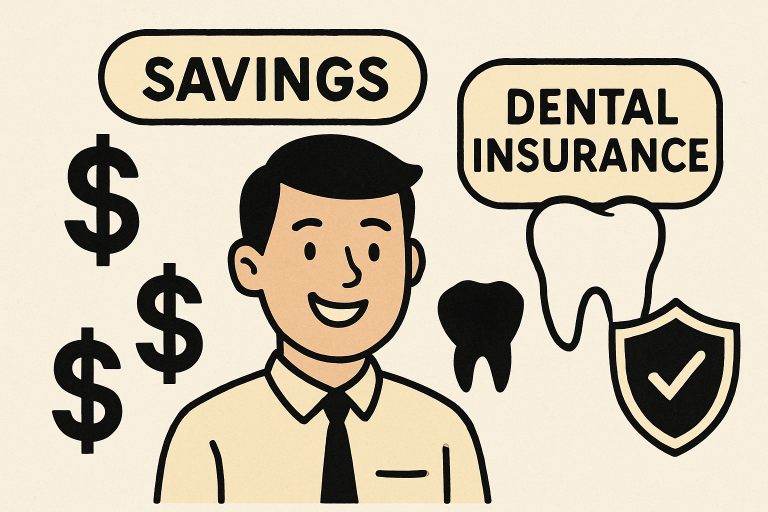Key Takeaways
- Dentists identify costly health issues early, saving employees on expensive treatments.
- Dental insurance typically covers preventive care at no additional cost.
- In-network providers offer discounted rates, reducing overall expenditures.
- Dental coverage supports employee productivity and retention.
Table of Contents
- Cost Savings Through Preventive Care
- Negotiated Rates with In-Network Providers
- Reduction in Major Dental Expenses
- Improved Overall Health and Reduced Medical Costs
- Enhanced Employee Productivity and Satisfaction
- Financial Security and Peace of Mind
- Access to Educational Resources
- Conclusion
Introduction
Good oral health doesn’t just affect your smile—it’s tied closely to your overall well-being and financial stability. Employees often overlook the importance of dental coverage, but comprehensive plans can provide substantial cost savings and peace of mind. By making informed choices and leveraging benefits, employees can effectively manage costs. If you’re looking to evaluate coverage options side by side, you can explore Delta Dental plan comparisons to identify plans best suited for your workforce.
Navigating the complex dental benefits landscape can often feel daunting and overwhelming for many employees. However, by taking the time to understand the essential details of their coverage options—such as what procedures are covered, the limits of their plans, and the importance of preventative care—employees can empower themselves to make the most of their dental plans. This knowledge can help them minimize unexpected surprise bills, maximize the value of their benefits, and ultimately improve their overall oral health and wellness outcomes.
Cost Savings Through Preventive Care
One of the biggest advantages of dental insurance is that it often covers routine preventive care—such as cleanings, exams, and X-rays—at 100%. These preventive services encourage employees to schedule regular visits without concern for upfront out-of-pocket expenses. According to Guardian Life Insurance Company, employer groups with higher utilization of preventive dental benefits report fewer expensive claims for major and restorative procedures. The increased use of preventive care measures and health screenings by employers and employees alike not only encourages healthier lifestyles but also translates to reduced insurance premiums for both parties, resulting in significant cost savings. These savings benefit both immediate healthcare expenses and contribute to long-term financial planning and stability for individuals and organizations.
Negotiated Rates with In-Network Providers
Dental insurers negotiate fee schedules with their participating network dentists. Employees who choose these in-network providers access dental care at significantly discounted rates compared to typical retail prices. For example, a basic filling or cleaning can be notably more affordable thanks to these pre-negotiated rates—sometimes saving members 30% or more versus out-of-network costs.
How It Works
Insurers like Delta Dental maintain strict quality standards for their network practitioners, which means members can enjoy the benefits of cost savings without compromising on care quality. This arrangement reduces claims costs and eliminates unplanned expenses, making dental care more predictable and affordable for employees and their families.
Reduction in Major Dental Expenses
Neglecting regular dental visits often leads to the need for extensive and expensive dental work—such as crowns, bridges, root canals, or other complex procedures—later on. Preventive appointments covered by dental insurance plans are incredibly important because they allow for the early detection and treatment of minor problems before they develop into more serious issues, thereby preventing the need for more costly and invasive treatments. Several comprehensive studies and reports, including those published by the Centers for Disease Control and Prevention (CDC), consistently show that people who attend regular dental check-ups and cleanings are significantly less likely to require major restorative procedures and extensive dental work, which can run into hundreds or even thousands of dollars, often causing undue financial strain and discomfort.
Improved Overall Health and Reduced Medical Costs
Oral health issues such as gum disease, cavities, and periodontal problems can significantly exacerbate systemic health concerns, including serious conditions like heart disease, stroke, and diabetes. By actively encouraging and promoting routine dental care, preventive visits, and regular check-ups, employers may observe a positive ripple effect, notably in reduced overall medical claims and healthcare costs. Research highlighted by HR Dive suggests that employees who maintain good oral health also tend to have fewer sick days, lower medical expenses, and improved productivity—further reinforcing the value of comprehensive and integrated dental insurance offerings as part of employee benefits packages.
Enhanced Employee Productivity and Satisfaction
Dental health is a crucial aspect of overall employee well-being and can significantly impact workplace productivity. Dental problems are among the leading causes of unplanned absences, as employees often need to take time off to seek treatment or deal with pain. When employees have access to reliable dental insurance, they are more likely to seek prompt dental care, which helps prevent minor issues from escalating into more serious and time-consuming health problems. This proactive approach reduces the number of days lost due to dental emergencies or treatment needs.
Moreover, offering comprehensive benefits—including dental insurance—serves as a powerful tool for enhancing employee satisfaction and morale. When companies demonstrate a genuine commitment to the health and wellness of their workforce, they foster a positive work environment and build loyalty among employees. This, in turn, helps attract top talent in a competitive job market and encourages existing staff to stay longer, reducing turnover costs. Overall, investing in robust dental benefits benefits both employees’ health and the company’s success by promoting a healthier, more productive, and more satisfied workforce.
Financial Security and Peace of Mind
An unexpected dental emergency, such as a broken tooth, a severe infection, or other urgent dental issues, can significantly disrupt an employee’s personal budget and financial stability. Dental insurance plays a vital role in helping employees manage these sudden, often costly, dental needs by providing financial coverage. It helps shield employees from the high out-of-pocket expenses associated with urgent care, root canals, crowns, or other complex dental procedures, giving them greater confidence that their oral health requirements won’t deplete their savings. This added layer of financial security not only alleviates immediate concerns but also contributes to overall peace of mind. As a result, employees can better focus on their job responsibilities and productivity without the stress of looming medical bills or unexpected expenses.
Access to Educational Resources
Many dental insurers offer an extensive range of educational resources designed to assist members in better understanding their coverage options and how to maximize the benefits provided by their plans. These resources often include online cost estimators, oral health tips, detailed plan explainers, and other informative tools. By having access to comprehensive and clear information, employees are empowered to make more informed decisions regarding their treatments, select appropriate providers, and determine the optimal timing for care. This proactive approach promotes effective preventive care, which can lead to improved oral health outcomes and significant reductions in personal costs over time. Overall, these educational amenities serve as valuable support systems that enhance member engagement and encourage proactive health management.
Conclusion
Dental insurance is more than just an added perk—it’s a proactive investment in employees’ health, financial stability, and overall job satisfaction. By making preventive care affordable, limiting big-ticket surprises, and promoting healthy habits, dental insurance helps both employees and employers save money and foster a healthier work environment. Comprehensive dental benefits are a cornerstone of a competitive employee package, offering both significant cost savings and critical peace of mind for today’s workforce. Expanding on this, it is clear that accessible dental coverage can lead to improved overall health outcomes, reduce long-term healthcare costs, and enhance employee retention and morale. Employers who prioritize dental benefits demonstrate their commitment to employee well-being, which in turn, can boost productivity and strengthen organizational loyalty. Incorporating comprehensive dental plans into employee benefits portfolios not only provides financial advantages but also signals a company’s dedication to fostering a healthier, more satisfied workforce, ultimately contributing to a more dynamic and resilient organization.
READ ALSO: Beyond the Waiting Room: Your Pocket Guide to DignoTech and Egypt’s Health-Tech Revolution










